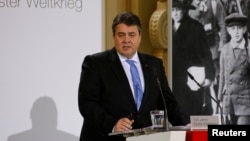BEIJING —
Germany's Deputy Chancellor Sigmar Gabriel, on a visit to Beijing, called on China to play a more active role in helping to resolve the crisis in Ukraine, including using its influence with Russia.
Gabriel, leader of the Social Democrats (SDP) and minister for the economy and energy in Chancellor Angela Merkel's cabinet, said shortly before meeting Chinese Premier Li Keqiang that he would address the subject of Ukraine in his talks.
“Of course we will ask the Chinese to do justice to their increased international responsibility and to engage in [solving] conflicts, like the one we are experiencing at the moment in Europe between Ukraine and Russia,” said Gabriel.
China, a permanent member of the U.N. Security Council, has adopted a cautious, low-key response to the crisis. It has not wanted to alienate key ally Russia or comment directly on the referendum in which Crimea voted overwhelmingly to join Russia, lest it set a precedent for its own restive regions, like Tibet.
But China has also said it would like to continue to develop “friendly cooperation” with Ukraine and that it respects Ukraine's independence, sovereignty and territorial integrity.
Gabriel said he expected China to “also use its (improving relations) with Russia to make clear that international law and the integrity of borders be respected.”
An international agreement to avert wider conflict in Ukraine looked to be faltering this week as pro-Moscow separatist gunmen showed no sign on Monday of surrendering government buildings they had seized.
Gabriel, accompanied by a large delegation of business chiefs, is on a two-day visit to China.
Gabriel, leader of the Social Democrats (SDP) and minister for the economy and energy in Chancellor Angela Merkel's cabinet, said shortly before meeting Chinese Premier Li Keqiang that he would address the subject of Ukraine in his talks.
“Of course we will ask the Chinese to do justice to their increased international responsibility and to engage in [solving] conflicts, like the one we are experiencing at the moment in Europe between Ukraine and Russia,” said Gabriel.
China, a permanent member of the U.N. Security Council, has adopted a cautious, low-key response to the crisis. It has not wanted to alienate key ally Russia or comment directly on the referendum in which Crimea voted overwhelmingly to join Russia, lest it set a precedent for its own restive regions, like Tibet.
But China has also said it would like to continue to develop “friendly cooperation” with Ukraine and that it respects Ukraine's independence, sovereignty and territorial integrity.
Gabriel said he expected China to “also use its (improving relations) with Russia to make clear that international law and the integrity of borders be respected.”
An international agreement to avert wider conflict in Ukraine looked to be faltering this week as pro-Moscow separatist gunmen showed no sign on Monday of surrendering government buildings they had seized.
Gabriel, accompanied by a large delegation of business chiefs, is on a two-day visit to China.





